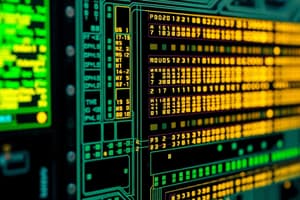Podcast
Questions and Answers
What does 'Architecture' in computer science refer to?
What does 'Architecture' in computer science refer to?
- The operation of individual components
- The way components relate to each other
- How features are implemented
- The attributes visible to the programmer (correct)
Which aspect of computer systems does 'Organization' focus on?
Which aspect of computer systems does 'Organization' focus on?
- How features are implemented (correct)
- How components relate to each other
- The operation of individual components
- The attributes visible to the programmer
What is a distinguishing factor between Architecture and Organization in computer systems?
What is a distinguishing factor between Architecture and Organization in computer systems?
- Memory technology used
- The way components relate to each other (correct)
- The operation of individual components
- The number of bits used for data representation
Which family of processors shares the same basic architecture according to the text?
Which family of processors shares the same basic architecture according to the text?
What are the three main computer functions mentioned in the text?
What are the three main computer functions mentioned in the text?
According to the passage, which of the following is an example of a computer architectural attribute?
According to the passage, which of the following is an example of a computer architectural attribute?
The passage suggests that the decision to implement a multiply instruction using a special multiply unit or the add unit is an example of which aspect of computer design?
The passage suggests that the decision to implement a multiply instruction using a special multiply unit or the add unit is an example of which aspect of computer design?
According to the passage, which of the following is NOT considered an organizational attribute of a computer system?
According to the passage, which of the following is NOT considered an organizational attribute of a computer system?
The passage suggests that the decision to implement a multiply instruction in a computer system would be considered a matter of:
The passage suggests that the decision to implement a multiply instruction in a computer system would be considered a matter of:
Which of the following best describes the relationship between computer architecture and computer organization according to the passage?
Which of the following best describes the relationship between computer architecture and computer organization according to the passage?
What is the primary difference between computer architecture and computer organization according to the passage?
What is the primary difference between computer architecture and computer organization according to the passage?
What was a key advantage of the IBM System/370 architecture?
What was a key advantage of the IBM System/370 architecture?
What is the relationship between architecture and organization in microcomputers, as described in the text?
What is the relationship between architecture and organization in microcomputers, as described in the text?
What is a hierarchical system?
What is a hierarchical system?
What do designers focus on at each level of a hierarchical system, according to the text?
What do designers focus on at each level of a hierarchical system, according to the text?
How does the text characterize the behavior of a system at each level?
How does the text characterize the behavior of a system at each level?
Which of the following statements is NOT true, based on the information in the text?
Which of the following statements is NOT true, based on the information in the text?
Flashcards are hidden until you start studying
Study Notes
Computer Architecture and Organization
- Computer architecture refers to attributes visible to a programmer, such as instruction set, data representation, I/O mechanisms, and addressing techniques.
- Computer organization refers to operational units and their interconnections that realize architectural specifications, including hardware details transparent to the programmer.
Architectural Attributes
- Examples of architectural attributes include:
- Instruction set (e.g., whether a computer has a multiply instruction)
- Number of bits used to represent data types (e.g., numbers, characters)
- I/O mechanisms
- Addressing techniques
Organizational Attributes
- Examples of organizational attributes include:
- Control signals
- Interfaces between the computer and peripherals
- Memory technology used
Distinction between Architecture and Organization
- Historically, the distinction between architecture and organization has been important for computer manufacturers offering a family of computer models with the same architecture but differing in organization.
- This allows for different price and performance characteristics for different models in the family.
Example: IBM System/370
- The IBM System/370 architecture was first introduced in 1970 and included a range of models with different price and performance characteristics.
- Over the years, IBM introduced new models with improved technology, retaining the same architecture to protect the customer's software investment.
Microcomputers
- In microcomputers, the relationship between architecture and organization is close, with changes in technology influencing both.
- There is less requirement for generation-to-generation compatibility in microcomputers, leading to more interplay between organizational and architectural design decisions.
Computer Structure and Function
- A computer is a complex system composed of millions of elementary electronic components.
- A hierarchical system is a set of interrelated subsystems, with each level consisting of components and their interrelationships.
- The behavior at each level depends on a simplified, abstracted characterization of the system at the next lower level.
Structure and Function
- Structure refers to the way in which components are interrelated.
- Function refers to the operation of each individual component as part of the system.
Computer Functions
- All computer functions can be categorized into:
- Data processing
- Data storage
- Data movement
- Control
Studying That Suits You
Use AI to generate personalized quizzes and flashcards to suit your learning preferences.




